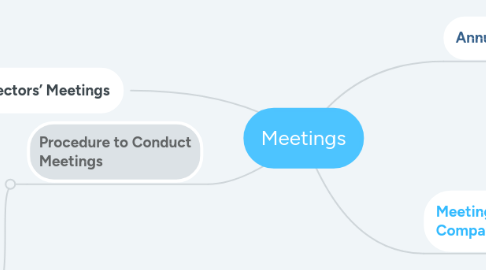
1. Procedure to Conduct Meetings
1.1. Notice of Meetings o Section 316 Private Company – other than to pass of a special resolution, shall be called at least 14 days or any longer period specified in its constitution. Public Company - other than to pass of a special resolution, notice should be given; • If AGM, at least 21 days or any longer period specified in its constitution and • In other case, at least 14 days or any longer period specified in its constitution o An AGM may be called by a shorter notice if all the members agreed. o Special resolution- Notice not less than 21 days o Section 319 Notice shall be in writing and shall be given to members either In hard copy In electronic form or Partly in hard copy and partly in electronic form
1.1.1. Venue o Section 327 – Subject to the constitution, a company may convene a meeting at more than 1 venue using any technology or method that enables the members’ right to participate and to exercise their rights.
1.1.1.1. Quorum o Section 328 – If the company only have 1 member, only 1 member to constitute a quorum o If more than 1 member, 2 members or proxy shall be quorum unless stated otherwise in the constitution. o A meeting which does not have enough quorum is invalid. o Section 334 Appointment of Proxy – member of the company have right to appointed another person as his proxy to exercise all of his right to attend, participate, speak and vote at a meeting.
1.1.1.1.1. Resolutions o Ordinary resolution passed by a simple majority of more than half of members or proxy that allowed to vote in the meeting. o Special resolution are resolutions passed at meetings requiring written notice at least 21 days approval of not less than 75% of such members or proxy that allowed to vote at the meeting
2. Board of the Directors’ Meetings
2.1. Notice Notice of board meetings due notice must be given convening a meeting of directors Omission of notice-Court may set aside the meeting If all the directors are present together and consent to a meeting being held without notice, proceeding is valid despite the defect in convening the notice Case: Khoo Choon Yam v Gan Miew Chee @ Gan Khuan Poh, Dato’ Dr & 6 Ors (2000)
2.1.1. Chairperson The director may elect one of their number as chairperson and determine the period for him to hold office If the person elected but not present within 15 minutes, the directors present may choose one of them to replace him
2.1.1.1. Quorum Shall be fixed by the board if not, shall be a majority of directors resolution passed at directors meeting without proper quorum is invalid
2.1.1.1.1. Voting Every director has one vote The chairperson shall have a casting vote
3. Annual General Meeting (AGM)
3.1. • Section 2 defined Annual General Meeting (AGM) • “In relation to a public company, means a meeting of the company required to be held by Section 340” • AGM compulsory to public companies only
3.1.1. • Purpose: o Fulfill the company’s obligation to its members. o Occasion where members of company will meet the directors and have the opportunity to question them on the company’s accounts, the directors’ report, company’s position and prospects o To exercise statutory vote:- Election of directors, appointment of auditors, issue shares, payment of dividends, etc.
3.1.1.1. • Mandatory for every type of public company • its relevant legislation to convene and hold a general meeting in each calendar year as its AGM • First AGM 18 months of its incorporation • Section 340 (2) Subsequent AGM shall be held; o Within 6 months of the company’s financial year end o Not more than 15 months after the last preceding annual general meeting.
3.1.1.1.1. • Matters to be transacted at the AGM – Section 340 (1) o The laying of audited financial statements and the reports of the directors and auditors o The election of directors in place of those retiring o The appointment and fixing of the fee of directors o Any resolution or other business of which notice is given accordance the Act or the constitution.

